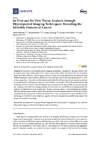Identificador persistente para citar o vincular este elemento:
https://accedacris.ulpgc.es/jspui/handle/10553/58286
| Título: | In-vivo and ex-vivo tissue analysis through hyperspectral imaging techniques: Revealing the invisible features of cancer | Autores/as: | Halicek, Martin Fabelo Gómez, Himar Antonio Ortega Sarmiento, Samuel Marrero Callicó, Gustavo Iván Fei, Baowei |
Clasificación UNESCO: | 3314 Tecnología médica | Palabras clave: | Hyperspectral imaging Clinical diagnosis Biomedical optical imaging Cancer Medical diagnostic imaging, et al. |
Fecha de publicación: | 2019 | Proyectos: | Identificación Hiperespectral de Tumores Cerebrales (Ithaca) | Publicación seriada: | Cancers (Basel) | Resumen: | In contrast to conventional optical imaging modalities, hyperspectral imaging (HSI) is able to capture much more information from a certain scene, both within and beyond the visual spectral range (from 400 to 700 nm). This imaging modality is based on the principle that each material provides different responses to light reflection, absorption, and scattering across the electromagnetic spectrum. Due to these properties, it is possible to differentiate and identify the different materials/substances presented in a certain scene by their spectral signature. Over the last two decades, HSI has demonstrated potential to become a powerful tool to study and identify several diseases in the medical field, being a non-contact, non-ionizing, and a label-free imaging modality. In this review, the use of HSI as an imaging tool for the analysis and detection of cancer is presented. The basic concepts related to this technology are detailed. The most relevant, state-of-the-art studies that can be found in the literature using HSI for cancer analysis are presented and summarized, both in-vivo and ex-vivo. Lastly, we discuss the current limitations of this technology in the field of cancer detection, together with some insights into possible future steps in the improvement of this technology. | URI: | https://accedacris.ulpgc.es/handle/10553/58286 | ISSN: | 2072-6694 | DOI: | 10.3390/cancers11060756 | Fuente: | Cancers (Basel) [ISSN 2072-6694], v. 11 (6), p. 756 |
| Colección: | Artículos |
Citas SCOPUSTM
176
actualizado el 08-jun-2025
Citas de WEB OF SCIENCETM
Citations
176
actualizado el 15-feb-2026
Visitas
126
actualizado el 01-nov-2024
Descargas
163
actualizado el 01-nov-2024
Google ScholarTM
Verifica
Altmetric
Comparte
Exporta metadatos
Los elementos en ULPGC accedaCRIS están protegidos por derechos de autor con todos los derechos reservados, a menos que se indique lo contrario.
